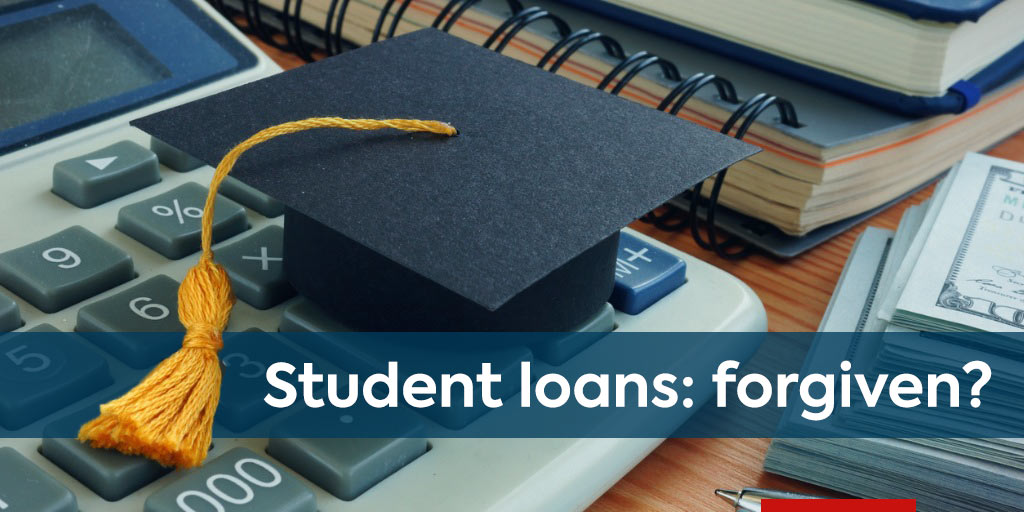
What you need to know about the student loan forgiveness program
January 1, 2023
 By Chris Jackson
By Chris Jackson
V.P. of Retail Banking
UPDATE: Courts block student loan forgiveness
A federal appeals court has temporarily blocked President Biden's student loan forgiveness plan as of Friday, Oct. 21, stopping any debt from being erased while the legal challenge makes its way to the Supreme Court.
The online application for the program is no longer live at StudentAid.gov.
Six states (Iowa, Nebraska, Kansas, Missouri, Arkansas and South Carolina) have filed a lawsuit against the program, saying the Biden administration does not have the legal authority to broadly cancel student loan debt.
That didn't stop the education department from launching its online application at StudentAid.Gov, where more than 26 million people applied for the one-time college debt cancellation.
Subscribe to our newsletter to stay updated on the latest details.
There has been a lot of talk recently about the student loan forgiveness program recently announced by President Biden.
You may have heard about $10,000 or even $20,000 in student loans being forgiven. Perhaps you read something about income requirements to qualify. Maybe you even saw the whole program could still be cancelled!
To clear up confusion and give you a better picture the facts surrounding student loan forgiveness, we’ll explain more about the proposed federal program, its qualifications, and how it could impact you.
Will student loans be forgiven?
On Aug. 24, 2022, the Biden Administration announced a one-time “Student Loan Debt Relief” cancellation of up to $20,000 in federal student loans for millions of Americans. But not everyone with student loans qualifies for this forgiveness program, and it still faces an array of legal challenges that could dismantle the plan before any cancellations get handed out.
In other words, nothing is official yet — and won't be until the Supreme Court decides whether or not the student loan forgiveness program is legal.
Do I qualify for student loan forgiveness?
First things first, the student loan forgiveness program only applies to federal student loans.
Private student loans from a financial institution like a bank, or a loan funded through the school, do not qualify for this loan forgiveness program.
If you are unsure whether your student loans are federal or private, you can check the Department of Education’s “Who is my loan servicer?” website at studentaid.gov.
There are four types of Federal Direct loans:
- Direct Subsidized Loan
- Direct Unsubsidized Loan
- Direct PLUS Loans (for parents; or graduate or professional students)
- Direct Consolidation Loans
On Sept. 29, 2022, the Biden administration said borrowers will not qualify who have older federal student loans now held by private lenders. These include Federal Family Education Loans (FFEL) or Perkins Loans, which up until Sept. 29, borrowers were told could be consolidated into a Federal Direct loan to qualify. Not anymore.
Any borrower who consolidated their FFEL or Perkins loans before Sept. 29 will still qualify and be “grandfathered” in; others appear to be out of luck.
Meanwhile, if you have one of the four federal student loans listed above, you may qualify for loan forgiveness — as long as you also meet the income requirements listed below.
Loan forgiveness income requirements:
Here is how the Department of Education outlines eligibility for student loan cancellation:
- “To be eligible, your annual income must be below $125,000 (for individuals) or $250,000 (for married couples or heads of households).
- Up to $20,000 debt cancelled: If you received a Pell Grant in college and meet the income threshold.
- Up to $10,000 debt cancelled: If you did not receive a Pell Grant in college but still meet the income threshold.
If you have additional questions, you can view the FAQs on the Student Debt Relief Plan Explained page on the Department of Ed’s website.
How to apply for student loan forgiveness
It is not currently possible to apply for the one-time forgiveness program, at least until the Supreme Court decides on the case. The online application at StudentAid.gov currently says “Courts have issued orders blocking our student debt relief program. As a result, at this time, we are not accepting applications.”
If you already applied for the program, the Department of Education says it will “hold your application.” We assume this means the application will remain valid until the matter is resolved in court — one way or the other. If the Supreme Court allows the program, we assume that the online application will be turned back on.
Sign up for our free newsletter to stay up-to-date as more information unfolds.
Watch out for scams
If you’ve heard about the new student loan forgiveness program, you can bet that scammers have too. Know the signs of a student loan forgiveness scam, and remember this — no government or financial agency will contact you out of the blue and ask for your personal information. If you get an email, text, phone call or mail offer that asks for up-front fees, claims to instantly wipe out debt, or doesn’t come directly from a college, bank or government agency — it’s probably a scam.
Federal student loan payments are still paused for everyone.
The Biden administration has also extended the existing student loan repayment pause through at least “60 days past June 30, 2023,” or until the Supreme Court makes a decision — whichever comes first. No one has been required to make federal student loan payments since the start of the COVID-19 pandemic, and this freeze will continue for at least a few more months.
What matters most:
While there are still details to be announced, and possible legal challenges to the Student Debt Relief program, it’s pretty clear who will qualify for federal student loan forgiveness if the program survives.
And all is not lost for private student loan borrowers, either. Your financial institution may have options and programs to help with your debt, so set up a time to talk with an expert on how to best manage your student loans.